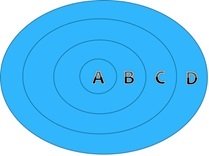 |
Learn English Locally, Apply It Worldwide! Enjoy Regular Practice |
We Use 4 Communication Elements
in Expressing Our Ideas
Not everybody stops to think about the basic 4 communication elements: The concepts; the reality or belief; attitudes and emotion; and the discourse aspect. They apply not only to the English language - they basically apply to the act of communication, whichever language you're speaking.
|
We know that each sentence we write/say reflects the three main choices we make in the process: |
 |
Imagine four circles, one inside another, representing different kinds of meaning function and the different ways of organising these functions. The communicative grammar we use on this website is based on the following aspects:
- Concepts: they are the basic meaning categories of a language. We impart these in the form of words and phrases or clauses we use and they are usually smaller units than a sentence. Examples of concepts are: time, place, direction, duration, cause (see more)
- Reality or belief: Here we deal mainly with sentences and these can be of various kinds. They can be statements, questions and answers, affirmations or denials, espressions of possibility and certainty. The words will convey the concepts from the above section but we're going to present them according to the truth and falsehood which we need to disclose in our communication.
- Attitudes and emotions: We express these
depending of the relationship between the speaker and the listener. The
communication act has a social goal of controlling or influencing the
actions and attitudes of the listener. It does this by using speech acts
such as commanding, requesting, advising, promising and other ways of
persuading. The aspect of point 2. above is used here, but it is
'adapted' to fit a different kind of social function. For example a
question is not just a means of eliciting information, but it can also
be adapted 'pragmatically' for the purpose of making an offer, or a
suggestion. The aspect of language we're dealing with here is the actual
utterance of the words, ie how we express our message, including
stress, intonation and body language.
- The discourse aspect: The last but not least important aspect of our communication is how we arrange and express our thoughts. There needs to be an order and a connection between our thoughts and the words we use need to be arranged in a specific order so that we communicate our message in the most effective way. This is where grammar gives us a multitude of choice in this matter. We can't use sentences in isolation - we do this in test & exam papers, but in conversation this is not sufficient. There needs to be a unity among our words and sentences, which is the subject of the text or discourse aspect of communication.
English Corner Weekly E-zine
Packed with knowledge, published on Tuesdays.
Get yours here!
Our Archives:
Our lessons in the names and sounds of letters, short & long vowel sounds, CVCs, CCVCs, CVCCs, sight words, vowel and consonant contrasts, etc.
Our lessons will help increase your vocabulary, word recognition, find meaning in context, skills for TOEFL tests and other games, for fun.
Here we shall build some lessons to help you improve your writing skills.
Lots of lessons: cause & effect, comparisons, linking signals, relative clauses, presenting information, expressing emotions and grammar games, of course. We had more lessons on: intensifying adverbs and phrasal verbs, expressing various concepts such as addition, exception, restriction and ambiguity. Lately we started some exercises: likes/dislikes, frequency adverbs (twice), verb tenses, etc.
Learn how to build a website, by using the SBI! system - start from the basics, developing a site concept and a niche, supply and demand, learn about profitability and monetization, payment processing, register domain, website structure and content as a pyramid. Also learn about the tools I'm using to build this website. We also covered how to build traffic, working with search engines, building a good system of inbound links, using social marketing and blogs with the SBI system, how to use Socialize It and Form Build It, how to publish an e-zine and how to build a social network in your niche.
We looked at a few games by now: Countable & uncountable nouns, Free Rice, Name That Thing, Spell It, Spelloween, the Phrasal Verbs Game, Preposition Desert, The Sentence Game, Word Confusion, Word Wangling, Buzzing Bees, and The Verb Viper Game.
Be prepared to play and learn more pretty soon.
